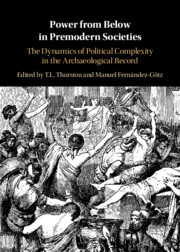 Power from Below in Premodern Societies
Power from Below in Premodern Societies Book contents
- Power from Below in Premodern Societies
- Power from Below in Premodern Societies
- Copyright page
- Contents
- Figures
- Contributors
- Preface
- One Power from Below in the Archaeological Record
- Two Fragmenting Trypillian Megasites
- Three Structure and Agency
- Four Power Requires Others
- Five “And Make Some Other Man Our King”
- Six Societies against the Chief? Re-Examining the Value of “Heterarchy” as a Concept for Studying European Iron Age Societies
- Seven Peasants, Agricultural Intensification, and Collective Action in Premodern States
- Eight The Spread of Scribal Literacy in Han China
- Nine Confronting Leviathan
- Ten The Emergence of Monte Albán
- Eleven Dispersing Power
- Twelve The Perplexing Heterarchical Complexity of New Guinea Fisher-Forager Polities at Contact
- Thirteen Restoring Disorder
- Index
- References
One - Power from Below in the Archaeological Record
Trends and Trajectories
Published online by Cambridge University Press: 08 October 2021
- Power from Below in Premodern Societies
- Power from Below in Premodern Societies
- Copyright page
- Contents
- Figures
- Contributors
- Preface
- One Power from Below in the Archaeological Record
- Two Fragmenting Trypillian Megasites
- Three Structure and Agency
- Four Power Requires Others
- Five “And Make Some Other Man Our King”
- Six Societies against the Chief? Re-Examining the Value of “Heterarchy” as a Concept for Studying European Iron Age Societies
- Seven Peasants, Agricultural Intensification, and Collective Action in Premodern States
- Eight The Spread of Scribal Literacy in Han China
- Nine Confronting Leviathan
- Ten The Emergence of Monte Albán
- Eleven Dispersing Power
- Twelve The Perplexing Heterarchical Complexity of New Guinea Fisher-Forager Polities at Contact
- Thirteen Restoring Disorder
- Index
- References
Summary
In 1856, a young Edward Burnett Tylor spent six months in Mexico investigating the Toltec civilization with antiquarian Henry Christy, and many of his later and profoundly influential notions about “culture” and “civilization” were formed there. In his report on a trip to the pyramids of Teotihuacan he notes: “As has often been remarked, such buildings as these can only be raised under peculiar social conditions. The ruler must be a despotic sovereign, and the mass of the people slaves, whose subsistence and whose lives are sacrificed without scruple to execute the fancies of the monarch, who is not so much the governor as the unrestricted owner of the country and the people. The population must be very dense, or it would not bear the loss of so large a proportion of the working class and vegetable food must be exceedingly abundant in the country, to feed them while engaged in this unprofitable labour” (Tylor, 1861: 142).
- Type
- Chapter
- Information
- Power from Below in Premodern SocietiesThe Dynamics of Political Complexity in the Archaeological Record, pp. 1 - 39Publisher: Cambridge University PressPrint publication year: 2021
References
- 2
- Cited by
